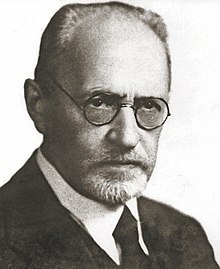Moses Schorr
Moses Schorr (born May 10, 1874 in Przemyśl , Austria-Hungary , † July 8, 1941 in Posty in the Uzbek SSR ) was a Polish historian , orientalist , rabbi and politician of Jewish origin. Schorr was the first historian to deal systematically with the history of the Jews in Poland . The focus of his research, however, was in ancient studies , especially in the history and languages of the Near East in pre-Christian times. The Polish form of the name is: Mojżesz Schorr.
Life
From 1893 Schorr studied history and philosophy at the University of Vienna and at the same time attended seminars at the Israelite Theological Institute ( rabbinical seminar ). In 1896 he moved to the University of Lemberg , where he received his doctorate in 1899 with a thesis on the organization of the Jews in Poland. The following year he became a rabbi. In 1904 he became a private lecturer and in 1910 professor for Semitic languages . In parallel to his academic teaching, Schorr participated in social and political life. At times he was chairman of the teachers' association for Jewish religion in Galicia , then chairman of the Society for the Promotion of Education among the Jews and he founded the Society for the Promotion of Jewish Youth. Schorr supported the settlement campaign in Palestine and was chairman of the Friends of the Hebrew University of Jerusalem , to whose opening in 1925 he was invited as a guest of honor.
From 1925 Schorr was a professor at the University of Warsaw and at the same time co-founder of the Institute for Jewish Studies . At the same time he held the office of rabbi at the Great Synagogue in Warsaw , where he also organized the Judaic Library. At times he served as vice-chairman of the B'nai B'rith lodge . From 1918 Schorr was a member of the Oriental Commission of the Academy of Sciences in Krakow. In 1935 Schorr was directly elected to the Senate of the Polish Parliament.
After the outbreak of World War II , Schorr found himself in the Soviet-occupied part of Poland. He was arrested and sent to a penal camp in Uzbekistan . At the request of his relatives from Palestine and France, the USA, the Pope and the Polish embassy in the USSR sought his release in vain.
Schorr's scientific achievement and social commitment were honored with the foundation (Mojżesz-Schorr-Stiftung) established in Warsaw in 2001 and named after him. The aim of the foundation is to promote Jewish culture. The foundation, financed by sponsors, maintains the Mojżesz-Schorr-Zentrum, which u. a. Offers language courses and organizes advanced training seminars.
Fonts
- Documents of the old Babylonian civil and procedural law . Leipzig 1913.
- From the history of the Jews in Przemysl . Vienna 1915.
- Legal status and internal constitution of the Jews in Poland. A historical panorama . In: The Jew. A monthly . Issue 2 (1917/1918); Volume 3, pp. 51-58; 179-186; No. 4, 233-244; also as a separate print Berlin 1917.
literature
- Schorr, Moses . In: Encyclopaedia Judaica , 1971, Volume 14, pp. 998f.
- Maria Gotzen-Dold: Mojżesz Schorr and Majer Bałaban: Polish-Jewish historians of the interwar period . Göttingen: Vandenhoeck & Ruprecht, 2014 ISBN 978-3-525-36998-2
Web links
- Literature by and about Moses Schorr in the catalog of the German National Library
- Literature by and about Moses Schorr in the bibliographic database WorldCat
- Literature by and about Moses Schorr in the JCS University Library Frankfurt am Main: Digital Collections Judaica
- both journal articles by Schorr in German are available on the Internet: [1]
- Roman Zakharii: Moses Schorr and Meir Balaban . Forgotten Eastern European Jewish Historians . Budapest 1998. [2] [3] ( MS Word ; 182 kB)
- Roman Zakharii: M. Schorr, The Outstanding Rabbi, Assyriologist And Historian of Eastern European Jewry . Jewish Lviv 51 (2008). link
- Mojżesz Schorr Foundation in Warsaw Link Link
| personal data | |
|---|---|
| SURNAME | Schorr, Moses |
| ALTERNATIVE NAMES | Schorr, Mojżesz |
| BRIEF DESCRIPTION | Polish historian, orientalist, rabbi and politician |
| DATE OF BIRTH | May 10, 1874 |
| PLACE OF BIRTH | Przemyśl |
| DATE OF DEATH | July 8, 1941 |
| Place of death | Posty, Uzbek SSR |

